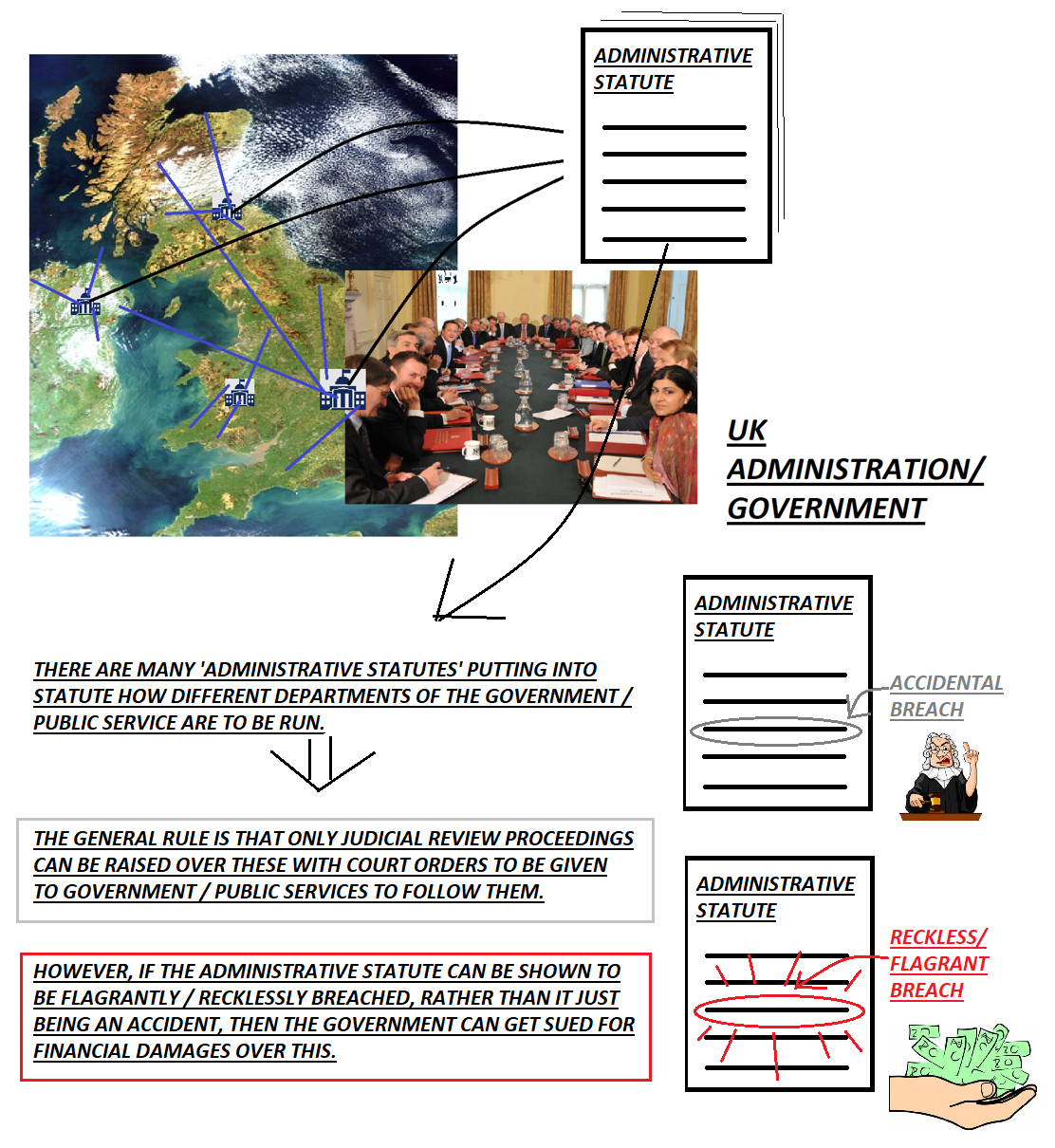X (Minors) v Bedfordshire CC [1995] UKHL 9
Citation:X (Minors) v Bedfordshire CC [1995] UKHL 9
Rule of thumb:Can the Government ever be sued for damages for not applying an administrative statute? The general answer is no, however, if it can be shown that the administrative statute has been breached flagrantly then this can result in an action for damages in the civil Courts being raised upon this.
Rule of thumb:Can schools or orphanages be sued for damages in the civil Courts not doing their duties properly? No, not unless it can be shown that the statutory duty has been flagrantly breached.
Background facts:
There were 3 very different scenarios heard in this case. The first scenario was from children who argued that the local authority should be made liable after claims of them being subject to sexual abuse were not investigated properly. The second scenario was a pupil who was struggling at school and claimed that they did not get sufficient support from the school. The third was from a pupil who argued that the school should be liable for not diagnosing them as dyslexic.
Parties argued:
The parties in each case argued that the Council should be liable for damages and pointed towards statutory provisions they were in breach of as the justification for this.
Judgment:
The Court upheld none of the claims. The Court affirmed that the presumption is that breach of an administrative statute only gives rise to the standard rights in judicial review, and not damages. However, if the litigant could prove that there was a flagrant breach of these provisions, then they could still make an argument on damages could still be made. The Court further affirmed that if a person can make an argument that substantive law has been breached towards them, then the Court’s primary duty is to provide them with a form of remedy. The Court affirmed in this case that the breaches of statute by the Council were not sufficiently flagrant to uphold arguments for damages in breaching them.

Ratio-decidendi:
‘The question is whether, if Parliament has imposed a statutory duty on an authority to carry out a particular function, a plaintiff who has suffered damage in consequence of the authority's performance or non-performance or that function has a right of action in damages against the authority. It is important to distinguish such actions to recover damages, based on a private law cause of action, from actions in public law to enforce the due performance of statutory duties, now brought by way of judicial review. The breach of a public law right by itself gives rise to no claim for damages. A claim for damages must be based on a private law cause of action. The distinction is important because a number of earlier cases (particularly in the field of education) were concerned with the enforcement by declaration and injunction of what would now be called public law duties. ... In my judgment, as in the child abuse cases, the courts should hesitate long before imposing a common law duty of care in the exercise of discretionary powers or duties conferred by Parliament for social welfare purposes. The aim of the Act of 1981 was to provide, for the benefit of society as a whole, an administrative machinery to help one disadvantaged section of society. The statute provides its own detailed machinery for securing that the statutory purpose is performed. If, despite the complex machinery for consultation and appeals contained in the Act, the scheme fails to provide the benefit intended that is a matter more appropriately remedied by way of the Ombudsman looking into the administrative failure than by way of litigation. For these reasons I reach the conclusion that an education authority owes no common law duty of care in the exercise of the powers and discretions relating to children with special educational needs specifically conferred on them by the Act of 1981…. I must again emphasise that, since the appeals concerned striking out applications. I have had to assume throughout that the allegations made in the statement of claim in the five appeals are correct. In justice to the local authorities, it must be made clear that their version of the facts has not been heard, nor has the truth of the plaintiffs' allegations been investigated. The defendant authorities deny the allegations made’. Lord Browne Wilkinson, ‘first claim on the loyalty of the law is that wrongs should be remedied and that very potent counter considerations are required to override that policy’, Lord Browne -Wilkinson at 26
Warning: This is not professional legal advice. This is not professional legal education advice. Please obtain professional guidance before embarking on any legal course of action. This is just an interpretation of a Judgment by persons of legal insight & varying levels of legal specialism, experience & expertise. Please read the Judgment yourself and form your own interpretation of it with professional assistance.

